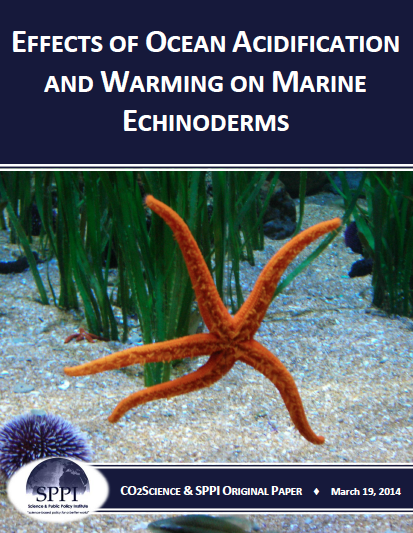News / Random
Effects of Ocean Acidification and Warming on Marine Echinoderms

Most of the ocean acidification research conducted to date has focused solely on the biological impacts of declining seawater pH. Few studies have investigated the interactive effects of ocean acidification and temperature. This summary examines what has been learned in such studies of echinoderms, highlighting several studies that challenge the alarming and negative projections of the IPCC on the matter.
Gooding et al. (2009) measured growth rates and feeding rates of juvenile sea stars (Pisaster ochraceus) maintained in 246-liter aquaria that were filled with recirculating natural sea water maintained at temperatures ranging from 5 to 21°C, and which were constantly bubbled with either ambient air of 380 ppm CO2 or CO2enriched air of 780 ppm CO2. Results indicated that "the relative growth (change in wet mass/initial wet mass) of juvenile P. ochraceus increased linearly with temperature from 5°C to 21°C," and that it also responded positively to atmospheric CO2 enrichment. More specifically, the authors state that "relative to control treatments, high CO2 alone increased relative growth by ~67% over 10 weeks, while a 3°C increase in temperature alone increased relative growth by 110%." They also state that increased CO2 "had a positive but non-significant effect on sea star feeding rates, suggesting CO2 may be acting directly at the physiological level to increase growth rates." Last of all, their data show that the percentage of calcified mass in the sea stars dropped from approximately 12% to 11% in response to atmospheric CO2 enrichment at 12°C, but that it did not decline further in response to a subsequent 3°C warming at either ambient or elevated CO2. In light of such
observations the three Canadian researchers say their findings demonstrate that "increased CO2 will not have direct negative effects on all marine invertebrates, suggesting that predictions of biotic responses to climate should consider how different types of organisms will respond to changing climatic variables." Indeed, they clearly state -- and without equivocation -- that "responses to anthropogenic climate change, including ocean acidification, will not always be negative."
